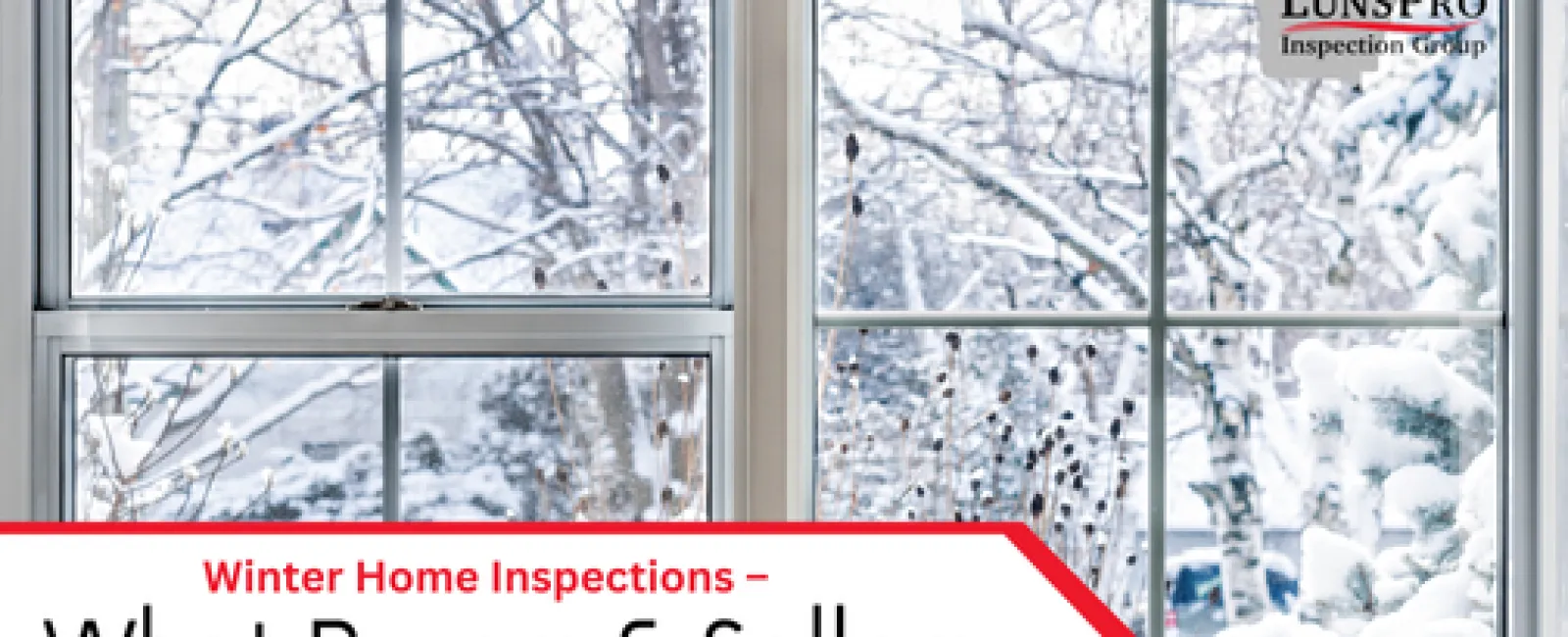As the temperatures drop and winter sets in, home buyers and sellers alike may wonder whether scheduling a home inspection during this season is a wise decision. Some may assume that the cold weather creates obstacles to a thorough inspection, while others may believe that winter conditions reveal hidden issues that might not be noticeable during warmer months. Regardless of the perspective, a winter home inspection is a crucial step in the real estate transaction process.
LunsPro Inspection Group specializes in providing Carolina residential and commercial inspections, including North Carolina home inspections, during all seasons, ensuring that buyers and sellers receive accurate, professional, and detailed evaluations of a property's condition. While winter inspections come with their unique challenges, they also offer a unique opportunity to identify issues that may not surface during other times of the year. Snow, ice, and cold temperatures can expose weaknesses in a home's structure, heating system, roof, and insulation, making a winter home inspection an invaluable tool for all parties involved.
Whether you are buying or selling a home during the winter months, understanding what to expect from a seasonal home inspection is essential. This article delves into the benefits and challenges of winter home inspections, what home inspectors look for, and how both buyers and sellers can prepare for a successful inspection process.
The Benefits of a Winter Home Inspection
1. Identifying Cold Weather-Related Issues
Winter weather puts a home's systems and structure to the test, helping inspectors uncover issues that may not be visible during the warmer months. Some of these include:
Heating System Performance - Cold temperatures allow inspectors to thoroughly assess the HVAC system, ensuring that the furnace or heat pump is functioning properly and efficiently.
Insulation & Drafts - A winter inspection can detect inadequate insulation and drafts that may lead to higher energy costs.
Roof Leaks & Ice Dams - Snow and ice accumulation can expose weaknesses in the roof, such as leaks or the formation of ice dams that could cause water damage.
Frozen Pipes - Inspectors can identify areas where pipes are at risk of freezing, which could prevent costly repairs in the future.
2. Less Competition in the Market
During the winter, fewer buyers are actively searching for homes, which means that those who are looking tend to be more serious. A winter home inspection can provide a clear picture of the property's condition without the rush and competition often seen in spring and summer real estate markets.
3. Faster Scheduling & More Attention from Inspectors
Because home sales tend to slow down in the winter, buyers and sellers can often schedule inspections more quickly and receive more focused attention from their inspectors. LunsPro Inspection Group ensures that every winter home inspection in North Carolina is conducted with the same thoroughness and professionalism as any other season.
Challenges of Winter Home Inspections
While winter inspections offer many advantages, they also come with certain challenges that buyers and sellers should be aware of.
1. Snow-Covered Roofs
One of the primary challenges of winter home inspections is assessing the roof. If snow or ice covers the roof, it may be difficult for inspectors to evaluate shingles, flashing, and potential problem areas. However, experienced inspectors will look for signs of leaks inside the home, such as stains on ceilings or walls, and assess attic insulation and ventilation to gauge roof health.
2. Limited Testing of Some Systems
Certain outdoor systems, such as irrigation systems, air conditioning units, and swimming pools, may not be fully testable during the winter months. However, an experienced inspector can still assess the overall condition of these systems based on visible components.
3. Potential Weather Delays
Severe winter weather can sometimes delay or complicate the home inspection process. Snow and ice may make it difficult to access certain areas of the property, but professional inspectors will do their best to provide a comprehensive evaluation regardless of the conditions.
What Home Inspectors Look for in Winter
1. Heating System Efficiency
Inspectors will evaluate the home's heating system to ensure it is operating efficiently and safely. This includes checking the furnace, boiler, heat pump, and ventilation systems for any signs of wear, damage, or inefficiencies.
2. Roof & Attic Inspection
Even if a roof is covered in snow, inspectors can examine the attic to check for proper insulation, ventilation, and signs of leaks or moisture damage.
3. Insulation & Energy Efficiency
A well-insulated home is essential for maintaining warmth during the winter months. Inspectors will assess insulation levels in the attic, walls, and basement, as well as check for drafts around doors and windows.
4. Plumbing & Pipe Protection
Frozen pipes can lead to costly damage. Inspectors check exposed pipes, look for signs of past freezing issues, and assess whether pipes are adequately protected from cold temperatures.
5. Exterior Inspection
Inspectors will evaluate the home's exterior, including siding, gutters, walkways, and driveways, to ensure that there are no structural issues or safety hazards caused by snow, ice, or freezing temperatures.
How Buyers Can Prepare for a Winter Home Inspection
Attend the Inspection - Whenever possible, buyers should attend the inspection to gain firsthand knowledge of any issues found.
Ask Questions - Buyers should use this opportunity to ask the inspector about winter-related concerns and how to properly maintain the home's systems.
Plan for Follow-Up Inspections if Needed - If certain areas of the home cannot be fully inspected due to snow or ice, buyers may consider requesting a follow-up inspection once conditions improve.
How Sellers Can Prepare for a Winter Home Inspection
Clear Snow & Ice - Sellers should ensure that driveways, walkways, and access points are free of snow and ice to allow the inspector easy access.
Provide Access to Important Areas - Ensure that the attic, basement, utility rooms, and any other critical areas are accessible for inspection.
Keep the Home Warm - Maintaining a comfortable indoor temperature will help the inspector evaluate heating performance and provide a more pleasant experience.
A winter home inspection offers buyers and sellers valuable insights into a property's condition during one of the harshest seasons of the year. Despite some challenges, such as snow-covered roofs and limited testing of outdoor systems, the benefits of identifying cold-weather-related issues far outweigh the drawbacks. LunsPro Inspection Group specializes in conducting thorough Carolina residential and commercial inspections, including North Carolina home inspections, ensuring that all clients receive accurate, detailed reports regardless of the season.
For buyers, a winter inspection provides reassurance that the home's heating, insulation, and structural integrity will withstand the colder months. For sellers, it helps identify and address potential issues before listing the property, making the sale process smoother and more transparent. By understanding what to expect from a winter home inspection and how to prepare for one, both buyers and sellers can navigate the process with confidence and peace of mind.

